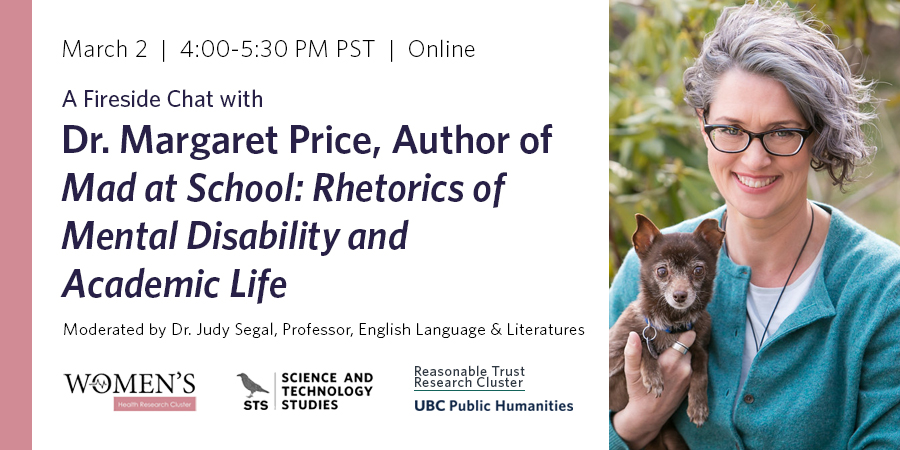
The Public Humanities Hub, partnering with the Women’s Health Research Cluster, is pleased to offer this opportunity to sit down with Dr. Margaret Price to discuss issues she addresses in her work on mental health and academic life. In conversation with Dr. Judy Segal, Dr. Price will take a Disabilities Studies approach to her topics, questioning some deeply-held, and generally unchallenged, values of university culture: rationality, productivity, presence, security, and independence—values typically consulted (deliberately and not) in assessments of both students and faculty members. She will talk about how we might ameliorate some of the problems that arise because of mentally-ableist assumptions and expectations within the academy. Dr. Price will address particular challenges to women in academe.
This event is free and open to all audiences.
Agenda
4:00-4:05—Welcome
4:05-5:00—Conversation with Dr. Margaret Price
5:00-5:30—Open dialogue between event attendees and Dr. Margaret Price, moderated by Dr. Judy Segal.
Speaker
Dr. Margaret Price is Associate Professor of English at The Ohio State University, specializing in disability studies and rhetorical theory. Mad at School: Rhetorics of Mental Disability and Academic Life (University of Michigan Press), won the Outstanding Book Award from the Conference on College Composition & Communication (CCCC). Dr. Price is co-PI of the Transformative Access Project (re-imagining “access”) and received a 2020 Fulbright Research Award. In 2017, she was inducted into the Susan M. Daniels Disability Mentoring Hall of Fame.
Moderator
Dr. Judy Segal is a Professor in the Department of English Language and Literatures and in the Science and Technology Studies Graduate Program. Her research focuses on the persuasive elements in discourses related to health and medicine.
Part of the UBC Science and Technology Studies (STS) Colloquium Series. This event is part of the programming for the data science stream of the “Reasonable Trust: Fostering Humanities Methods in Public Engagement with Science and Technology” Research Cluster, supported by the Public Humanities Hub.